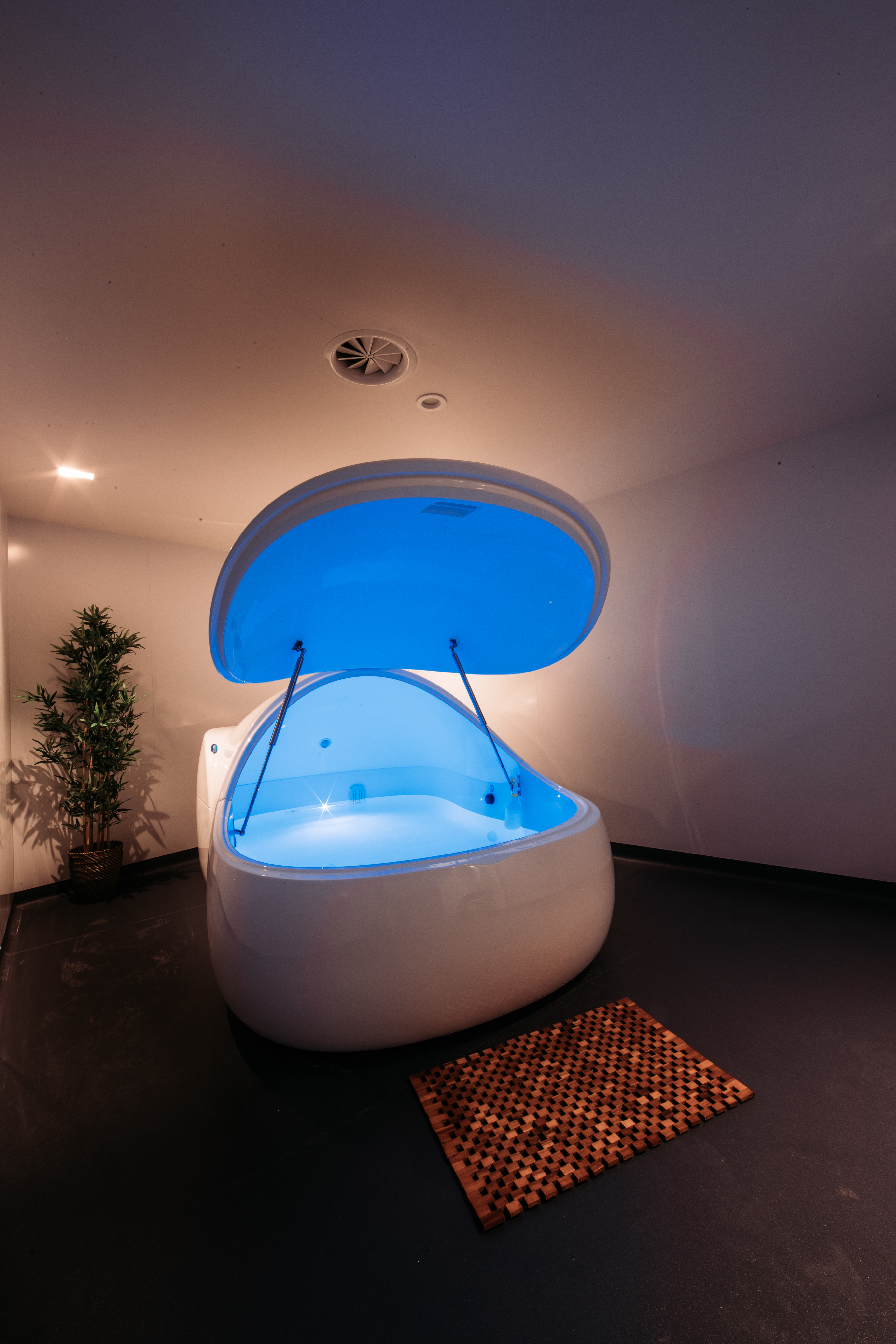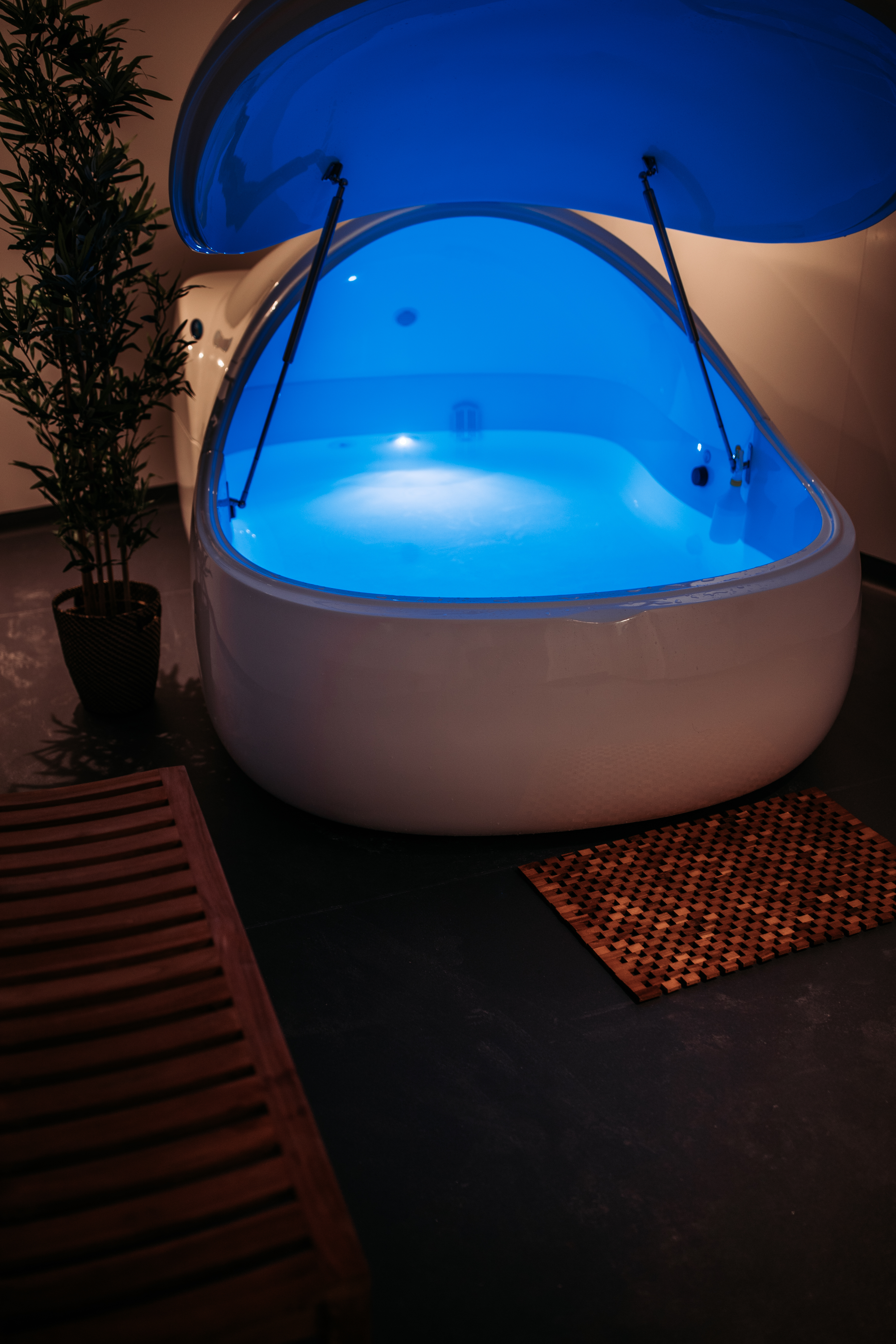How an hour in a floatation tank finally made me switch off

In our modern world, it feels like there are 101 new ways to take care of our bodies and our minds.
Anxietyis at an all-time-high. With more than 1 in 10 people likely to have a ‘disabling anxiety disorder’ at some stage in their life according to Anxiety UK,there's no doubting that a bit of help is necessary.
Therapy, mindfulness, and meditation are just some of the ways in which we can check in with our mental health, while things like yoga, HIIT, walking, and all sorts of new diet plans help us look after our physical wellbeing.
But have you ever considered submerging in a dark pod full of salt water as a cure to all of your modern day ills?
Enter: float therapy.
Flotation therapy and flotation tanks - or, sensory deprivation tanks - have been in wellness circles for decades; the idea being that muting all of life's distractions - noise, smell, touch - can offer you a blissful way of winding down and properly relaxing.
MORE:Third Space are launching wellness escapes – and the first location is dreamy
Sign up to our free daily email for the latest royal and entertainment news, interesting opinion, expert advice on styling and beauty trends, and no-nonsense guides to the health and wellness questions you want answered.
And there's recent research supporting the theory, too. In 2018, a study of 50 participants with stress and anxiety-related disorders found that after one, hour-long floating session, there were 'significant reductions' in 'stress, muscle tension, pain, depression and negative affect', accompanied by a 'significant improvement in mood characterised by increases in serenity, relaxation, happiness and overall well-being'.

On a mission to investigate the supposed benefits for myself, I booked in at one of the most popular floatation centres in London - Floatworks.
Although sceptical, I was more than willing to give it a try. As someone who find themselves often getting easily wound up by a claustrophobic tube journey, or irritated by noisy neighbours while trying to sleep, there was no doubt that I needed to relax a little...
My flotation tank experience
So could it really work? After a particularly busy day at the office, I headed down to Floatworks brand spanking new centre in Angel, London, to try the experience for myself.

Soon after, I was led into a private room - consisting of a surprisingly big white pod, full of the crystal-clear water. The pod itself is bigger than I'd first thought. It's not quite half way full, and there's a button to turn the light on and off, and an alarm button should you need it for any reason. The lid can't be left half-way open as it's on a lever, but it's best to shut it completely for the full experience.
Tinkering, spa-esque music is played for the first 10 minutes of your float to ease you in, but after that, you're left in complete silence and darkness - helped along by the ear-plugs you're told to wear to complete the idea of 'sensory deprivation', and to stop salt water getting in your ears.
I'll admit, for the first few minutes, it all felt a little terrifying. Although you know you're safe, being in the pitch black, with nothing to distract you - no outside noise, touch etc - can be disorientating. If you're claustrophobic, this one also may not be for you.

But after the first 10 minutes, I began to relax. It's totally normal to work out how to position yourself within the tank. I found myself regularly touching the sides as though making sure I wouldn't floating away. And while putting my hands behind my head was most comfortable for me, some people starfish, while others keep their hands down by their side.
During the 50-minute session, I finally felt myself start to decompress - not an easy ask of a particularly highly-strung writer. And as someone who is constantly checking their smartphone (for no real reason at all), it actually felt nice not to have anything sucking my attention and energy.
Instead of worrying about my plans for the rest of the evening and the next day, I found myself simply content to just 'be', taking note of my breathing and how my body felt in the water. While I reckon it would take me a few more sessions to discover the euphoria and meditative, sleep-like state many other floaters report to have achieved, I left my session feeling well on my way.
And even a busy underground and delayed train out of London couldn't stress me out, as I made my way home for a ridiculously relaxing night's sleep.
Floatworks Angel centre also have a 'relax' room where you can enjoy a tea and a sit down before heading out, as well as hairdryers, moisturiser and straighteners in their beauty room to get you looking your best again.

At £55 for an hour, float therapy isn't cheap. But it's undoubtedly found many coverts - so could it be right for you?
Float tank benefits
According to Chris Plowman, one of the founders of Floatworks, there are a myriad of positives to be gained from floating in a pod of Epsom salts for an hour, or more. Floating is a chance for our body to relax into a meditative state, without our attentions or stresses being turned elsewhere. The feeling of floating in the salt-dense water can, apparently, also provide your body with some much needed relief too. He explains, "The spinal-cord and back are free from the pressure of gravity. The nervous and muscular-skeletal systems can reset as tension is relieved.
"Floating activates the para-sympathetic nervous system (our ‘rest and digest’ mode) and puts our sympathetic nervous system (our ‘fight or flight’ response) on standby – allowing our body and mind to heal from the stresses of modern living."
But that's not all. Lowered stress and anxiety can reportedly help to improve sleep too, as well as improving any lingering aches and pains.
Neuroscientist John C Lilly, the creator of the original floatation tank, was also interested in examining the ways in which float therapy can help people to explore their conscious mind, allowing for more creativity and deeper thinking.
He explained, [Floating is] “the most important tool I have I’ve ever used for developing my mind, for thinking, for evolving."
Other benefits of float therapy
- Stress relief
- Improved sleep
- Pain relief
- Reduced anxiety
- Exfoliated skin
- Digital detox
Flotation tank near me
- Floatworks, Angel and Vauxhall, London (floatworks.com)
- London Flotation Centre, Isle of Dogs, London (londonfloatationcentre.co.uk)
- Float Planet, Liverpool, (floatplanet.co.uk)
- Float Level, Manchester city centre, (floatlevel.co.uk)
- The Edinburgh Floatarium, Edinburghm (edinburghfloatarium.co.uk)
There are many other float centres across the UK - a quick Google search should help you find one near you.
Amy Hunt is an experienced digital journalist specialising in homes, interiors and hobbies. She began her career working as the features assistant at woman&home magazine, before moving over to the digital side of the brand where she eventually became the Lifestyle Editor up until January 2022. Amy won the Digital Journalist of the Year award at the AOP Awards in 2019 for her work on womanandhome.com.

